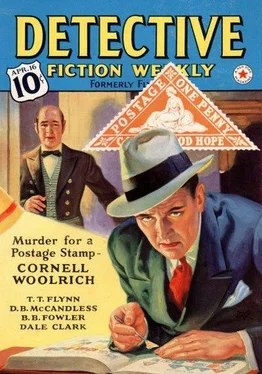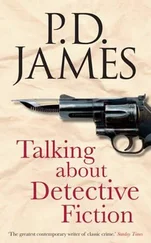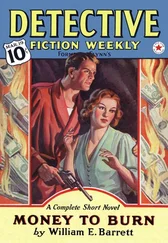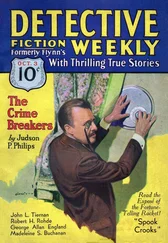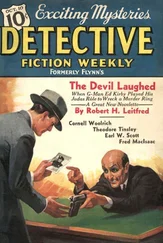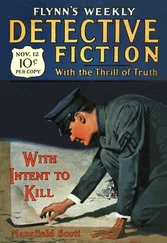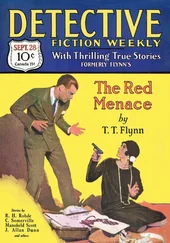Лоуренс Трит - Detective Fiction Weekly. Vol. 118, No. 6, April 16, 1938
Здесь есть возможность читать онлайн «Лоуренс Трит - Detective Fiction Weekly. Vol. 118, No. 6, April 16, 1938» весь текст электронной книги совершенно бесплатно (целиком полную версию без сокращений). В некоторых случаях можно слушать аудио, скачать через торрент в формате fb2 и присутствует краткое содержание. Город: New York, Год выпуска: 1938, Издательство: The Red Star News Company, Жанр: Детектив, на английском языке. Описание произведения, (предисловие) а так же отзывы посетителей доступны на портале библиотеки ЛибКат.
- Название:Detective Fiction Weekly. Vol. 118, No. 6, April 16, 1938
- Автор:
- Издательство:The Red Star News Company
- Жанр:
- Год:1938
- Город:New York
- ISBN:нет данных
- Рейтинг книги:3 / 5. Голосов: 1
-
Избранное:Добавить в избранное
- Отзывы:
-
Ваша оценка:
- 60
- 1
- 2
- 3
- 4
- 5
Detective Fiction Weekly. Vol. 118, No. 6, April 16, 1938: краткое содержание, описание и аннотация
Предлагаем к чтению аннотацию, описание, краткое содержание или предисловие (зависит от того, что написал сам автор книги «Detective Fiction Weekly. Vol. 118, No. 6, April 16, 1938»). Если вы не нашли необходимую информацию о книге — напишите в комментариях, мы постараемся отыскать её.
Detective Fiction Weekly. Vol. 118, No. 6, April 16, 1938 — читать онлайн бесплатно полную книгу (весь текст) целиком
Ниже представлен текст книги, разбитый по страницам. Система сохранения места последней прочитанной страницы, позволяет с удобством читать онлайн бесплатно книгу «Detective Fiction Weekly. Vol. 118, No. 6, April 16, 1938», без необходимости каждый раз заново искать на чём Вы остановились. Поставьте закладку, и сможете в любой момент перейти на страницу, на которой закончили чтение.
Интервал:
Закладка:
Flannagan beamed amiably and looked like the bright boy of the class. He had his favorite cue. “In a way, yes. The university has a police school — the Academy of Police Science, it’s called — and my job is to tackle the tough ones and show that the scientific methods get results where the old ones don’t. Then I send a line in to the papers to the effect that the Academy cracked another one. I’m paid for getting publicity, but my job is to find the truth regardless.”
“Science,” muttered Sheriff Reveneau slowly. “Ain’t nothin’ wrong with it if you use your plain common sense. Only when you use your common sense, ain’t no need for science.”
“I’ll make a bet with you, Sheriff. I’ll bet Seely didn’t shoot Lamport and that Lamport didn’t do it himself either, and I’ll prove it with this sort of thing.” He tapped the microscope. “If I’m wrong, I’ll come up here and work under you for three months. But if I’m right, you come down to the Academy and take a three months’ course in police work. Is it a bet?”
Reveneau scratched his head thoughtfully, then extended a great bearlike paw. “My hand on it,” he said. “But I’ll tell you one thing. Even if you proved somethin’ with this scientific stuff o’ yourn, they wouldn’t believe it up here. You got to show a jury what a man instead of a microscope tells.”
Paul Flannagan gripped the hand and hardly listened. He was already building up the publicity in his head. “County Sheriff Comes Out For Science.” The papers would eat it up.
Arthur Tannick went down on the train with Flannagan. Tannick took care of the legal end of the Seely interests and made enough out of it to have to juggle his own income tax. He was tall, smooth, with a nose that looked as if it were made for his pince-nez glasses rather than the glasses for it.
Tannick lit a cigar that smelt of tobacco and perfume. “It’s a mess,” he said irritably. “I told Seely as soon as he got out on bail to hop the jurisdiction. There’s no case unless Lamport takes the stand, and I can persuade him not to.”
“I told Seely if he jumped bail he’d practically admit he was guilty.”
“Well, isn’t he?”
“How do I know? About this Lamport — he’s a lawyer?”
Tannick nodded. “Doesn’t practise, though. More of a promoter than a lawyer.”
Flannagan said, “Seely and Lamport came up for some shooting and now they got a shooting and they don’t like it. I could feel sorry for that pair. All alone in the woods with nothing between them and the cold except a five-thousand-dollar shack, and nothing between them and starvation except Seely’s valet. Think of it, Tannick — two men and only one valet. The way I look at it, they should have brought along the chef from the Waldorf and then there wouldn’t have been any trouble.”
“No need of being facetious. They had angry words over a pudding, and though the statement sounds ludicrous, it was merely the excuse, the casus belli . If Lamport goes on the stand they’re bound to bring in a verdict of guilty. Even Lamport couldn’t explain how he shot himself and then disposed of the gun. Seems to me that’s the strongest point against Seely.”
Flannagan shrugged. “One point in Seely’s favor balances everything else you can possibly say.”
“What’s that?”
“Why in hell would he call me in if he were guilty? He knows I’ll get the truth, no matter what it is.”
“Maybe you overrate yourself, Flannagan.”
And little Flannagan snapped back, “Impossible!” and looked vastly pleased with himself.
But it was sheer bravado. The same bravado with which he’d talked himself into his job three months ago. The university had had a million dollars worth of police school and laboratory equipment but no pupils and no prestige. Flannagan had erupted with the idea that practical work, practical success was the answer. Solve a few murders, make the world know the Academy was cracking cases, and the Academy was made. He’d wrangled a trial for his scheme, with himself as publicity director.
Maybe it was luck, maybe it was little Flannagan’s liberal sprinkling of Academy funds, but the next important murder case was an Academy triumph. The papers stated that the police had arrested the murderer “in cooperation with the Scientific Academy of the University” and the police commissioner admitted he had had “invaluable help.” Thereafter Flannagan was made.
But it was a precarious making. One boner and the opposition would be on his neck. The jealous police officials who didn’t like to divide credit: the reactionaries who believed in the old-fashioned methods; the crooked politicians who were secretly connected with crime.
As soon as Flannagan reached New York, he walked into the Academy laboratory and put down the bag of ashes he’d collected from the fireplace of Seely’s cabin.
“Have a look at this stuff,” he said, “and let me know what you find.”
Stettinus, the laboratory wizard, tall, stooped, with a yellow wrinkled face and a mouth wide enough to grace a cartoon, said, “What’ll I look for?”
“Anything in general pudding in particular. Bread pudding, prune pudding. Maybe even cordite pudding. You never know these days.”
Stettinus sniffed. “Cordite?” he said, and went to work.
There was no cordite, of course. Pine ash, hickory ash, paper ash. Traces of prune pudding. A twisted cartridge case, unmarked. But no cordite, Flannagan read the report and did nothing — yet.
The newspapers interviewed Lamport as soon as he came out of the hospital. He indicated that a high sense of ethics and his feeling of responsibility as a citizen would compel him to appear at the Seely trial next month. As for Seely, he got out on bail, jumped the jurisdiction and persuaded the local authorities to do nothing except hope he’d show up at the proper time. Unusual? Sure. But the answer was Tannick and unlimited money.
Flannagan waited until Lamport had recovered and was back at work. Then Flannagan made an appointment, marched into Lamport’s luxurious office and said, “I want to talk to you about the Seely case.”
Lamport appraised him with sharp, calculating eyes. “Nothing I know of to talk about.”
“Oh yes there is. I’ve uncovered an extraordinary piece of evidence. Lamport. About an automatic pistol you own.” Flannagan consulted a slip of paper and read off some serial numbers. “That’s yours isn’t it?”
“Yes, but I don’t see what bearing—”
Flannagan interrupted. “Of course you don’t. The strongest point against Seely is that his gun was the only one on the scene and that one bullet was missing. A ballistic expert could prove the bullet that wounded you didn’t come from Seely’s gun, but country jury would say. ‘If it didn’t come from Seely’s then where the devil did it come from?’ And they’d disregard the evidence.”
“I’m not a ballistics expert and I saw who shot me. That should settle the matter.”
“Exactly. Except that I found a cartridge shell near the fireplace and I wondered whether I couldn’t hook it up to another weapon. So the other night I took the liberty of entering your apartment and borrowing your gun. I fired a few test shots and compared the ejector marks on the cartridge case with the marks on the cartridge from the fireplace.”
“And they didn’t match,” said Lamport, leaning forward with a shrewd expression.
“And they didn’t match,” agreed Flannagan genially. “But that, of course, is only between the two of us.”
“I don’t get you.”
Flannagan shrugged. “A simple matter to exchange the cartridge case from the fireplace for one of my test samples. Now, you see, they do match.”
Читать дальшеИнтервал:
Закладка:
Похожие книги на «Detective Fiction Weekly. Vol. 118, No. 6, April 16, 1938»
Представляем Вашему вниманию похожие книги на «Detective Fiction Weekly. Vol. 118, No. 6, April 16, 1938» списком для выбора. Мы отобрали схожую по названию и смыслу литературу в надежде предоставить читателям больше вариантов отыскать новые, интересные, ещё непрочитанные произведения.
Обсуждение, отзывы о книге «Detective Fiction Weekly. Vol. 118, No. 6, April 16, 1938» и просто собственные мнения читателей. Оставьте ваши комментарии, напишите, что Вы думаете о произведении, его смысле или главных героях. Укажите что конкретно понравилось, а что нет, и почему Вы так считаете.
